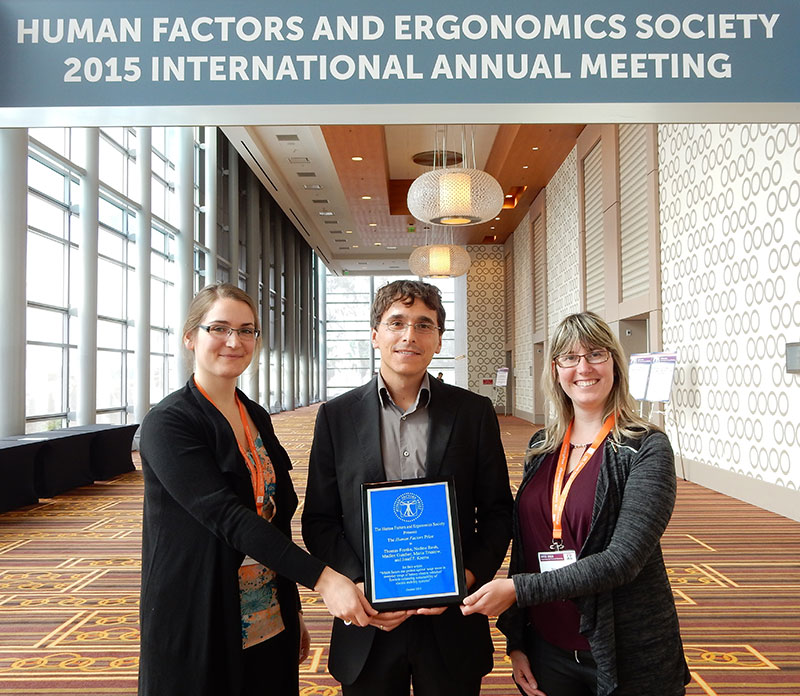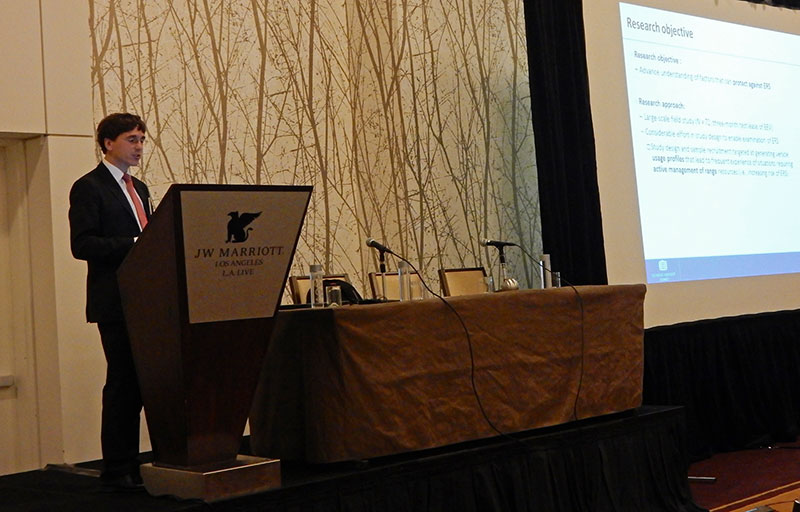Human Factors Prize for Research from Chemnitz
Psychologists of the TU Chemnitz were awarded from the world’s largest scientific association for human factors/ergonomics professionals for their paper on electric vehicle range stress
-

Madlen Günther (l.), Dr. Thomas Franke and Nadine Rauh show the award. Photo: Lynn Strother -

Dr. Thomas Franke was invited to present the research at the HFES International Annual Meeting in Los Angeles. Photo: Nadine Rauh
Thomas Franke, Nadine Rauh, Madlen Günther, Maria Trantow, and Josef F. Krems from the Chair of Cognitive and Engineering Psychology of the Technische Universität Chemnitz have received the 2015 “Human Factors Prize” from the Human Factors and Ergonomics Society. They were awarded for their article “Which Factors Can Protect Against Range Stress in Everyday Usage of Battery Electric Vehicles? Toward Enhancing Sustainability of Electric Mobility Systems”. The award comes with a 10,000 dollar cash prize and publication of the paper in the Society’s flagship journal, “Human Factors”. Moreover, Franke was invited to present his work at a special session last week at the HFES International Annual Meeting in Los Angeles.
The winning paper investigates the sustainability challenge of limited range in battery electric vehicles (BEVs) and identifies resilience factors that can protect against occurrences of range stress in everyday BEV usage. In the framework of the e-mobility showcase project „BMW ActiveE Leipzig – long-distance commuters“, a joint project of the BMW Group, TU Chemnitz and Stadtwerke Leipzig, funded by the Federal Ministry for the Environment, Nature Conservation, Building and Nuclear Safety, 72 users leased a BMW ActiveE for three months to test it on their daily commute and beyond. In the framework of the scientific user study it was examined which factors can lead to reduced range in everyday BEV usage. Factors that could be identified are, for example, more practical experience with limited range, a higher tolerance for low range situations, and perceived trustworthiness of the range estimation system. A key message of the paper is that more could be done to enable drivers easily cope with critical range situations without range stress.
“It is a great honor and tremendous delight that our paper has won this year’s Human Factors Prize, and I want to thank everyone who made this success possible,” says Franke. “We strongly believe that user-centered design has enormous potential to address future sustainability challenges, and that a thorough and theory-driven understanding of user interaction with low resource systems is necessary. Engineering psychology has many fruitful answers to the sustainability challenges we face.”
In keeping with the 2015 Human Factors Prize topic of sustainability/resilience, submissions focused on human factors/ergonomics research that addresses the long-term preservation of vital global resources with the goal of reducing consumption to protect the needs of future generations. Submissions to the competition were judged on the importance of the implications for sustainability/resilience, originality of the research, contribution to the HF/E knowledge base, and soundness of the methodology. The Human Factors and Ergonomics Society is the world’s largest scientific association for human factors/ergonomics professionals, with more than 4,800 members globally. HFES members include psychologists and other scientists, designers, and engineers.
The paper can be accessed here: https://www.tu-chemnitz.de/hsw/psychologie/professuren/allpsy1/pdf/HFPrizePaper.pdf
(Text adapted from press release of Human Factors and Ergonomics Society, see https://www.hfes.org/web/DetailNews.aspx?id=386)
Katharina Thehos
02.11.2015




